WhatsAlt: The Messenger Alternatives
Some use the internet, some function without servers, some are paid and others are free, but all these apps claim to have one thing in common—respect for user privacy


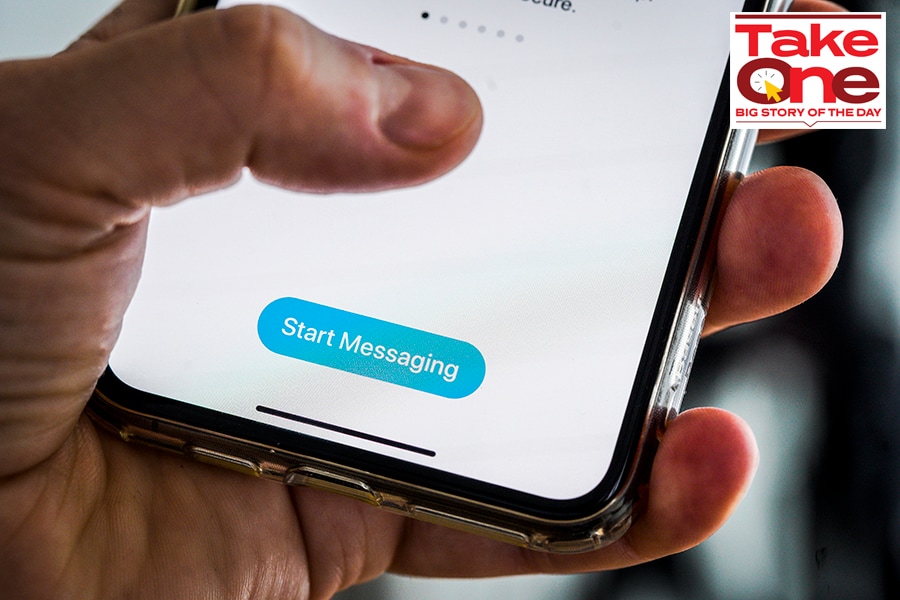 Image: Jaap Arriens/NurPhoto via Getty Images
Image: Jaap Arriens/NurPhoto via Getty Images
Ever since WhatsApp announced an update in its privacy policy, thousands of people rushed to download messenger alternatives such as Signal and Telegram. While these two have been in the news for their security features that are tighter than the messaging giant’s, there are other applications that have been around, used for both facilitating consumer-to-consumer messaging and within enterprises for their internal communication.
While some of these alternative apps need the internet, others don’t. Some function without servers with peer-to-peer technology, and are on a subscription model, while others are free to use. But they all claim to have one thing in common--respect for users’ privacy.
Although security and privacy-related technologies are constantly evolving making it difficult to lay down a clear benchmark for which app is completely secure, there are a few things users should be aware of to ensure their privacy is not compromised, say technology and privacy experts.
First, says Divij Joshi, technology policy fellow at Mozilla Foundation, a global non-profit, “It’s definitely important to have a communications protocol based on end-to-end encryption.”
End-to-end encryption refers to a system of communication wherein only the sender and receiver can read the messages and see the content shared.
However, Joseph Aloysius, a Singapore-based student researcher in surveillance studies, says, “Even with encryption it is important that it is device-based end-to-end encryption, and not cloud-based. In addition, the encryption setting should be a default setting, not optional as seen in Telegram.”
Another point to keep in mind is to ensure that technologies collect as little metadata–information not related to the message content but things like quantum or location of messages–as possible, adds Joshi.
Second, they should be open source and left open for public auditing. “Ideally, it’s best if companies leave the server code open as Signal has done,” says Aloysius.
Both Joshi and Aloysius are of the view that it is also necessary to ensure that the corporate practices of the application are clear and fair. “For instance, terms of use, the privacy policy, so they can’t alter the technology or data collection practices arbitrarily,” says Joshi.
Although there has been an uproar about the latest changes to the privacy policy, WhatsApp continues to remain popular primarily due to its ease of use and convenience, say experts. “For some, it may also be a cost concern. There may also be a false sense of security since nothing apparent has gone wrong and there have been no consequences to date for them using the app for business purposes,” explains Heidi Shey, principal analyst, security and risk, Forrester.
However, if you are a user who is concerned about privacy, here is a lowdown on alternatives to WhatsApp and the features they offer.
Wickr
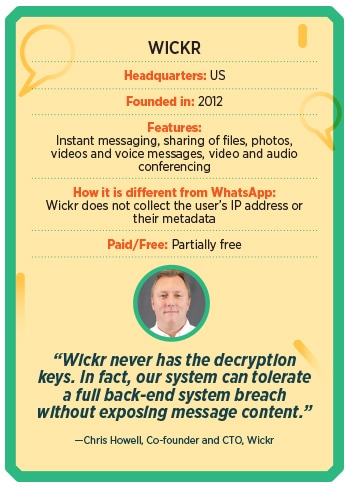
The San Francisco-based app, founded in 2012, is used by some of the biggest players in the federal space including the U.S. Department of Defense. It has also been validated by the National Security Agency as the, “most secure collaboration tool in the world,” says co-founder and CTO of Wickr, Chris Howell. He adds, “Our government and enterprise customers choose Wickr because we have the most secure, end-to-end encrypted platform on the market that enables sensitive mission and business communications without compromising compliance.”
Wickr’s largest user base is in the US, followed by Europe, India and Australia, but it has seen an uptick in both their consumer and commercial platforms ever since WhatsApp announced plans to update its privacy policy, says Howell.
While the app can be deployed by organisations in highly regulated industries such as banking, energy, healthcare and the federal government, one of its versions, Wickr Me, is more suitable for one-on-one conversations with family and friends. Wickr cannot identify owners because it doesn’t have access to any personal information. The data is encrypted and not accessible to the company. All the messages are stored on the user’s device and for a brief period on Wickr’s servers, but get deleted upon delivery. Since messages are end-to-end encrypted, even when messages are on the server, they are not available to the company.
With Wickr Me, users can share files, photos, videos and voice messages, and also do video and audio conferencing. The messages are ephemeral, meaning they only exist for a limited amount of time and get permanently deleted from the sending as well as the receiving device after a while. Therefore, if the recipient doesn’t check Wickr frequently, the messages may never get delivered. “Wickr’s security architecture and proprietary encryption methodology is designed to ensure that only users can gain access to their message content. Users’ content is encrypted locally on their device and is accessible only to intended recipients,” explains Howell.
Jami
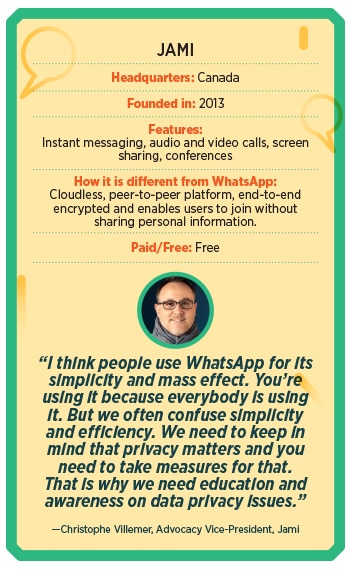
An open-source service, Jami doesn’t store users’ personal information on a central server, guaranteeing users full anonymity and privacy. Around since 2013, Christophe Villemer, advocacy vice-president of the Canada-based messenger app, says, “We really are a newcomer in the market, we estimate there are around 100,000 users around the globe but our community is growing every day.” He says Jami is peer-to-peer, which means it doesn’t require a server for relaying data between users. Therefore, users don’t have to worry about a third party conserving their video or data on its servers. With features such as HD video calling, instant and voice messaging, and file sharing, the service is free to use. All the connections are end-to-end encrypted. “At Jami, we think that privacy is a primary right on the internet. Everybody should be free not to give their data to corporations to benefit from an essential service on the internet,” says Villemer. “Also, we think that our solution, as it’s peer-to-peer, is globally better for the environment because it does not rely on huge server farms or data-centers,” he adds. Users of the service have no restrictions in terms of the size of the files they share, nor speed, bandwidth, features, number of accounts or storage. In addition, if users are on the same local network, they can communicate using Jami even if they are disconnected from the internet. “There will never be advertising on Jami,” says Villemer.
Briar
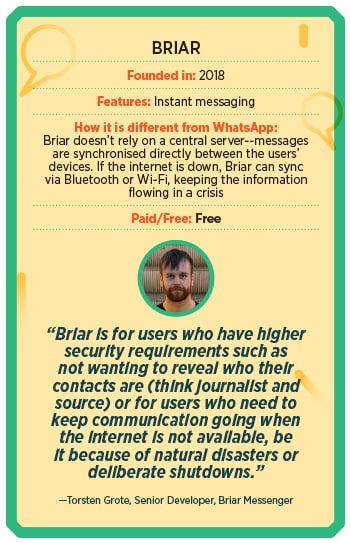
Briar Messenger is a not-for-profit organisation that started off as a project by Michael Rogers in an attempt to support freedom of expression, freedom of association, and the right to privacy. In India, Briar is extremely popular in Kashmir. Reason? It can work without the internet via Wi-Fi or Bluetooth. Launched in 2018, this application uses direct, encrypted connections to prevent surveillance and censorship. Briar allows users to form private groups (with one admin that can invite others), write blogs, and also create public discussion forums. The application doesn’t rely on central servers and sends across messages without leaking metadata.
Torsten Grote, senior developer, Briar Messenger, says, “Briar is for users who have higher security requirements such as not wanting to reveal who their contacts are (think journalist and source) or for users who need to keep the communication going when the internet is not available, be it because of natural disasters or deliberate shutdowns.” So far, Briar has around 200,000 downloads on Google Play and around 100,000 downloads from their website. The application is also available on F-Droid and other independent stores, which don’t track downloads. However, “thanks to the WhatsApp policy change,” says Grote, “we are seeing 7x the usual number of downloads.”
Threema
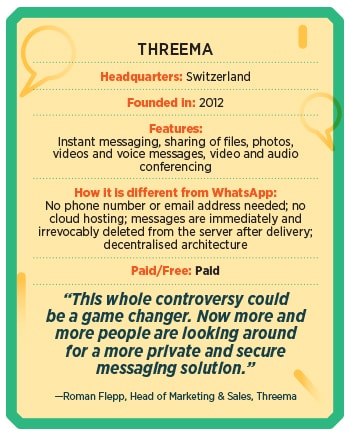
In 2012, three young software developers from Switzerland decided to create a secure instant messenger that would prevent the misuse of user data by companies and surveillance by governments. After Facebook bought WhatsApp in early 2014, the number of users climbed to 2 million in just a few weeks. “In Threema, all communication is protected in the best possible way by end-to-end encryption. Since Threema is open source, users can independently verify that Threema doesn’t have access to any user data that could be handed over to third parties,” says Roman Flepp, head of marketing and sales, Threema.
One of Threema’s guiding principles is “metadata restraint”, which means if there is no data, no data can be misused, either by corporations, hackers or surveillance authorities. Currently, the messenger has over 9 million users. In the light of the recent WhatsApp privacy issue, Flepp claims the daily download numbers have increased significantly, by a factor of 10. This growth has been consistently high since the policy change was announced. He adds, “This whole controversy could be a game changer. Now more and more people are looking around for a more private and secure messaging solution.”
The application can be used not only by individual users, but also businesses. Threema has various business solutions such as Threema Work and Threema Education. “Especially in the business environment, it is crucial that a secure and privacy-compliant solution is used for work-related communication. We see a great demand, more than 5,000 companies are already using our business solution Threema Work,” says Flepp. Currently, the team is working on creating a multi-device solution that will allow users to use Threema on multiple devices.
****
While a bunch of these applications are great options for secure peer-to-peer messaging, it is not a very sustainable revenue model for most of these companies. Hence, a few of them have moved to offer enterprise solutions. “For business use, a consumer-focused messaging app [like WhatsApp] is insufficient because it isn’t designed with business requirements for security, privacy, and compliance in mind,” says Shey.
Post the recent announcement about the policy changes, a lot of government organisations and companies banned the use of applications like WhatsApp on company-issued devices and for work. We take a look at some applications that offer paid messaging solutions to businesses.
Wire
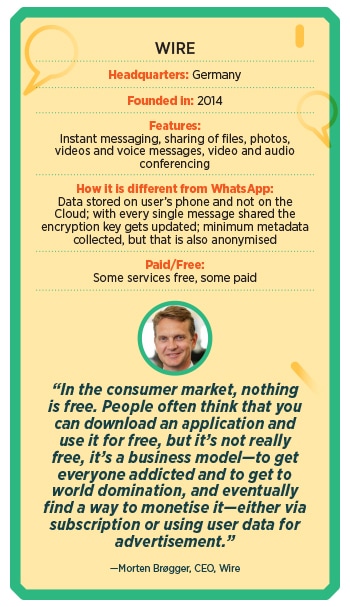
Though the idea for Wire was conceived in 2012, the product was only launched in 2014 and initially for consumers. However, in 2017, the Germany-based company decided to focus mainly on enterprises. This was because, says Morten Brøgger, CEO of Wire, “We were against giants like Facebook, and consumers were not willing to understand the importance of privacy and pay for it.” This was also around the same time that the General Data Protection Regulation (EU GDPR) was coming up, and privacy was becoming a major concern for organisations. “Hence, we felt the solution we built would be extremely compelling to enterprise consumers,” he adds.
Currently, Wire has close to 1,800 paid customers, which mainly include governments and large enterprises, whereas, for the general free solution, they have about half a million monthly active users. Most of their paid customers are in Germany, North America, Australia, the Middle East, and some European countries.
Most of the traditional enterprise SaaS solutions have a few risk points, including “man in the middle vulnerability” since the cloud provider is in the middle, which means all the processing and storage happens on the cloud. The main weakness here is that the cloud provider can technically access the encryption key, which means the cloud provider can technically read and listen to all your content. However, Wire has a very different architecture, wherein there is no man in the middle. “All the data resides in the application on your device. There is some storage on the cloud, for bigger files, and these are secured with individual encryption keys. But the encryption keys only exist on the devices of our users, there’s no copy of the keys on the cloud,” Brøgger says.
Another USP of this open-source application is that every time you send or receive a message—be it a text message, call, video conference or screen share—the encryption key updates, hence giving each individual message a unique encryption key. Says Brøgger, “We don’t know who the users are, what they are using it for and we barely collect any metadata, whatever little is collected to help synchronise different devices is also anonymised.”
Currently, the company is going at 400 percent revenue growth year-on-year. “We saw a great spike in the paid clients at the beginning of the pandemic, and now [due to the WhatsApp privacy policy issue] since enterprises are becoming more aware of the importance of privacy.”
Troop
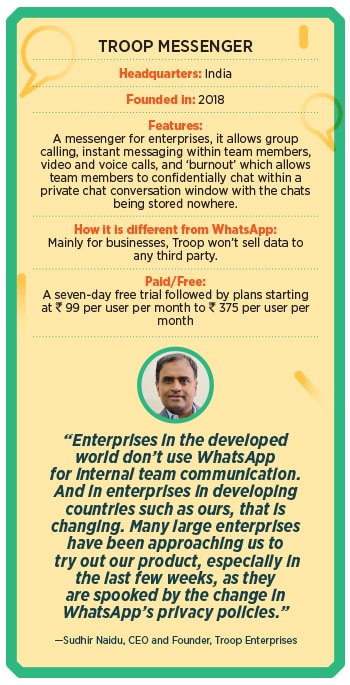
Troop Messenger was launched in mid-2018 as an internal messaging app for enterprises. “It is a home-grown, made in India, robust and a secured business messaging platform,” says CEO and founder Sudhir Naidu. A single platform, it enables internal teams to chat, make audio and video calls, convert them into conferencing, share screens, and create groups. It also features a self-destructible chat window to exchange secured information, and will shortly introduce an email client so users can both send e-mails and messages. “We have pledged that we would not sell any kind of user data to any third-party organisations. We assess and track all kinds of intrusions and attacks and follow the policy of honestly disclosing to clients if there is a breach which involves a threat to their data,” says Naidu. Additionally, Troop follows a stringent and comprehensive internal security framework and policy, in terms of development, testing and release.
Besides Indian enterprises, Troop Messenger has been seeing good traction from the US, UK and the Middle East, informs Naidu. “We see three times the usual daily registrations for our platform, since the [WhatsApp] policy came out,” he says. “Businesses that were using WhatsApp before are actively looking out for much safer and business-oriented platforms such as ours,” he adds.
Arattai
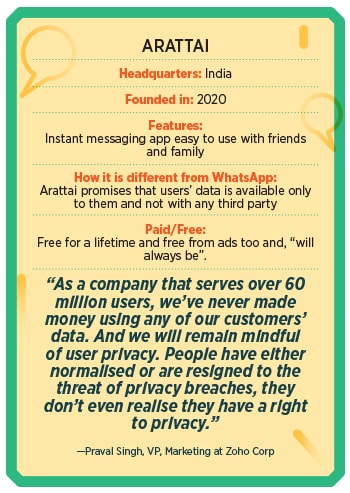
Zoho Corp, which has products like Zoho Mail and Zoho Business Suite, released a beta version of its messaging application Arattai, meaning chit-chat in Tamil, in the middle of the pandemic in 2020. “More than 70,000 users have already downloaded Arattai and we didn’t advertise at all,” says Praval Singh, VP, marketing at Zoho Corp. “The final application is close to being launched,” he adds. As a privately held company, Singh says, their focus is on user privacy. “We have retained that we’ve held that stance in many ways for our enterprise and business users. And we would like to take it forward with consumer applications as well. For example, we don’t use our own application or data of users to share with third parties, either as a monetisation strategy or for any other reason. So, data that sits on an application doesn’t go to a third party,” he says. In fact, they own their data centers. Therefore, they are not dependent on any third party or public clouds for storage.
Spike
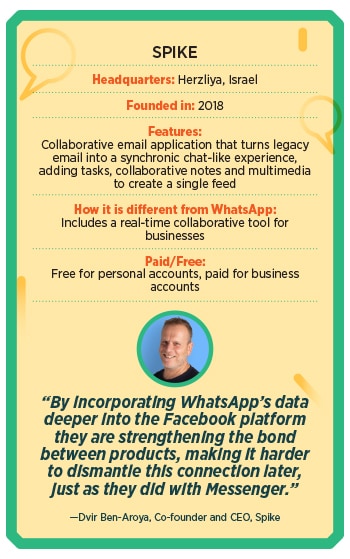
Initially released in October 2018, Spike is a conversational and collaborative email application that turns legacy email into a synchronic chat-like experience, adding tasks, collaborative notes and multimedia to create a single feed for work.
Instead of using another application, Spike turns an individual’s email address inbox into a hub for chatting with co-workers, friends, and family--as well as a place to work on documents, manage tasks, and share files. Unlike WhatsApp groups, says Dvir Ben-Aroya, co-founder and CEO of Spike, “Spike groups provide a real-time collaborative tool for businesses, without switching between separate team messenger apps.” The application promises to store minimum data to provide fast communication and ensure privacy. Currently, Spike has over 100,000 active teams using this application.
“We’ve seen a drastic uptick in users after the WhatsApp announcement, but since we track minimal user data, we cannot access specific data or directly attribute these users’ behaviour with correlation to using WhatsApp,” he says. Its highest user base is in the US, Germany, the UK, and it is very popular in India, especially among students and educators.
(With inputs from Namrata Sahoo)
First Published: Jan 22, 2021, 16:58
Subscribe Now